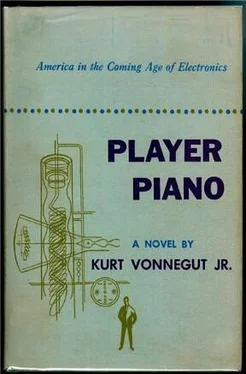MacCleary gave him a thick typewritten manuscript.
Gelhorne, his lips moving, leafed through it, frowning. No one spoke or smiled or looked at anyone else.
Paul considered the notion of Doctor Gelhorne's being the last of a race, and decided it was true. He had got to the top through a disorderly route that the personnel machines would never tolerate. Had machines been watching things when Gelhorne started his climb to the top, his classification card would have come flying out of the card files like an old Wheaties box top.
He had no college degree of any kind, other than bouquets of honorary doctorates that had come to him in his late fifties and sixties.
He'd had nothing to do with industry, in fact, until he was thirty. Before that, he'd pulled a mail-order taxidermy business out of bankruptcy, sold his interest in it, and bought a trailer truck. He'd built his fleet to five trucks when he received a hot market tip, sold his business, invested the proceeds, and tripled his wealth. With this bonanza, he'd bought the largest, yet failing, icecream plant in Indianapolis, and put the business in the black inside of a year by building icecream routes servicing Indianapolis manufacturing plants during the lunch hour. In another year, he had his trucks carrying sandwiches and coffee along with ice cream. In another year, he was running plant cafeterias all over town, and the ice-cream business had become a minor division of Gelhorne Enterprises.
He'd found that many of the manufacturing firms were owned by third- or fourth-generation heirs who, by some seeming law of decay, didn't have the nerve or interest the plants' founders had had. Gelhorne, half playfully at first, had offered these heirs advice, and found them amazingly eager to surrender responsibility. He'd bought in, watched and learned, and, discovering nerve was as valuable as special knowledge, he'd become manager and part owner of a dozen small plants.
When war became certain and the largest corporations were looking about for new manufacturing facilities, Gelhorne had delivered his prosperous community of plants to General Steel, and become an officer of that corporation. The rule-of-thumb familiarity he had with many different industries, as represented by the plants he'd taken over, had been broader than that of any executives General Steel had developed within its own organization, and Gelhorne was soon spending all his time at the side of the corporation's war-rattled president.
There he'd come to the attention of Paul's father in Washington, and Paul's father had made Gelhorne his general executive manager when the whole economy had been made one flesh. When Paul's father died, Gelhorne had taken over.
It could never happen again. The machines would never stand for it.
Paul remembered a week end long ago, when he had been a tall, skinny, polite, and easily embarrassed youth, and Gelhorne had paid a call. Gelhorne had suddenly reached out and caught Paul by the arm as Paul passed his chair. "Paul, boy."
"Yessir?"
"Paul, your father tells me you're real smart."
Paul had nodded uncomfortably.
"That's good, Paul, but that isn't enough."
"No, sir."
"Don't be bluffed."
"No, sir, I won't."
"Everybody's shaking in his boots, so don't be bluffed."
"No, sir."
"Nobody's so damn well educated that you can't learn ninety per cent of what he knows in six weeks. The other ten per cent is decoration."
"Yes, sir."
"Show me a specialist, and I'll show you a man who's so scared he's dug a hole for himself to hide in."
"Yes, sir."
"Almost nobody's competent, Paul. It's enough to make you cry to see how bad most people are at their jobs. If you can do a half-assed job of anything, you're a one-eyed man in the kingdom of the blind."
"Yes, sir."
"Want to be rich, Paul?"
"Yes, sir - I guess so. Yes, sir."
"All right. I got rich, and I told you ninety per cent of what I know about it. The rest is decoration. All right?"
"Yes, sir."
Now, after many years, Paul and Doctor Francis Eldgrin Gelhorne were looking at each other over the long table in the Council House at the Meadows. They weren't close friends, and there was none of Kroner's aromatic paternalism about Gelhorne. This was business.
"There's nothing new about the Society in this report," said Gelhorne.
"Only the part about Finnerty," said Lou MacCleary. "It's been slow going."
"It certainly has," said Doctor Gelhorne. "Well, Doctor Proteus and Doctor Kroner, the point is that this Ghost Shirt nonsense might turn out to be something pretty big. And Lou, here, hasn't been able to get an agent into it to find out what they're up to or who's running it."
"This bunch is smart," said Lou. "They're being pretty selective about who gets in."
"But we think we know how to get a man into it," said Gelhorne. "We think they'd be very tempted by a discontented manager and engineer. We think they've already recruited at least one."
"Finnerty," said Kroner heavily. "He finally registered with the police, incidentally."
"Oh?" said MacCleary. "What did he say he was doing with his time?"
"Says he's getting out Braille editions of pornography."
"He's being pretty cute now," said Gelhorne, "but I think we'll fix his wagon all right. But that's a side issue. The point we're getting at, Paul, is that I think they'll take you into the Ghost Shirt Society under the right conditions."
"Conditions, sir?"
"If we fire you. As of now, as far as anyone outside this room knows, you're through. The rumor's already circulating at the saloon, isn't it, Lou?"
"Yes, sir. I let it slip in front of Shepherd at dinner."
"Good boy," said Gelhorne. "He'll be taking over Ilium, by the way."
"Sir, about Pittsburgh -" said Kroner worriedly. "I promised Paul that he was slated for that job when he was finished with the investigation."
"That's right. In the meanwhile, Garth will run the works there." Gelhorne stood briskly. "All right, Paul? Everything clear? You're to get off the island tonight and back to Ilium." He smiled. "It's really a break for you, Paul. It gives you a chance to clear up your record."
"Record, sir?" Things were happening so quickly now that Paul could only seize upon a word and repeat it as a question in order to keep in the conversation.
"That business of letting Finnerty go through the plant unescorted, and the pistol affair."
"The pistol affair," said Paul. "Can I tell my wife?"
"I'm afraid not," said Lou. "The plan is that nobody outside this room is to know."
"It'll be hard, I know," said Gelhorne sympathetically. "But just now I'm remembering a young boy who told me he didn't want to be an engineer when he grew up, he wanted to be a soldier. You know who that boy was, Paul?"
"Me?" said Paul bleakly.
"You. Well, now you're in the front lines, and we're proud of you."
"Your father would be proud of you, Paul," said Kroner.
"I guess he would. He really would be, wouldn't he," said Paul. Gratefully he was welcoming the blind, invigorating heat of anger. "Sir, Doctor Gelhorne, may I say one more thing before you leave?"
Kroner was holding the door open for the Old Man. "All right, by all means."
"I quit."
Gelhorne, Kroner, and MacCleary laughed. "Wonderful," said the Old Man. "That's the spirit. Keep that up, and you'll fool the hell out of them."
"I mean it! I'm sick of the whole childish, stupid, blind operation."
"Attaboy," said Kroner, smiling encouragingly.
"Give us two minutes to get to the saloon before you leave," said MacCleary. "Wouldn't do for us to be seen together now. And don't worry about packing. Your stuff is being packed right now, and it'll be down at the dock in time for the last boat."
He shut the door behind himself, Gelhorne, and Kroner.
Читать дальше








![Курт Воннегут - Вампитеры, фома и гранфаллоны [litres]](/books/397997/kurt-vonnegut-vampitery-foma-i-granfallony-litre-thumb.webp)